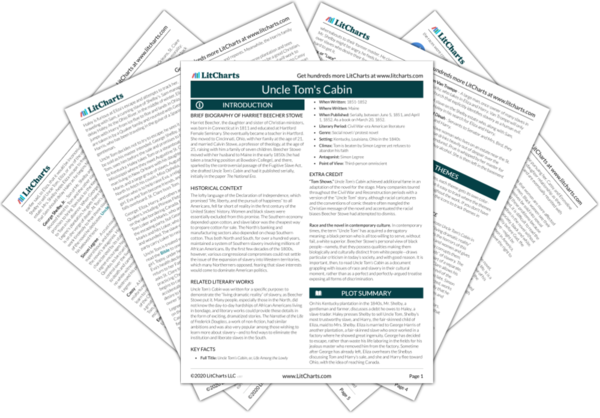Summary
Analysis
St. Clare purchases an eight- or nine-year-old slave with very dark skin named Topsy, so that Miss Ophelia might teach her manners. Miss Ophelia is upset, feeling that there are too many slaves in the house already, and Topsy is dirty and “heathenish,” but St. Clare convinces her to take Topsy on as a student.
Topsy serves as a foil to Eva, both in appearance (Topsy is very dark-skinned, and Eva very fair) and in behavior. Topsy embodies a total lack of Christian values, while Eva is so perfect as to seem an angel on earth.
Themes
When Miss Ophelia asks Topsy about her family and origins, Topsy replies that she has none; she has no knowledge of her past. Once, while doing chores, Miss Ophelia believes Topsy has stolen a bow belonging to Eva, and after threatening her, convinces Topsy to admit stealing it and other trinkets besides. Miss Ophelia later discovers that Eva never lost her bow, and Topsy admits to making up her confession to please her master. Exasperated, Miss Ophelia says she will have to whip Topsy, and St. Clare insinuates that his cousin is giving up on her ideals too easily.
An example of how slave attitudes and moralities are shaped by the reality of ownership. Topsy wishes only that her mistress does not harm her or yell at her—she will say what needs to be said in order to avoid punishment. Though this seems like lying to Miss Ophelia, it is in fact a natural defense born of years of mistreatment.
Themes
Miss Ophelia wonders that St. Clare lets Eva play with Topsy—she thinks it will harm Eva’s development, but St. Clare believes Eva is in fact teaching and improving Topsy. When Topsy misbehaves and Miss Ophelia asks why, Topsy answers that she was “born wicked,” and smiles.
Again, Miss Ophelia believes that it is not right for Eva to play with slaves—this is an example of northern hypocrisy, decrying slavery but wanting nothing to do with actual black men and women.
Themes
Miss Ophelia tries to teach Topsy the Bible, but Topsy learns the passages only by rote, and perhaps willfully misunderstands them, in order to anger her master. St. Clare finds Topsy amusing, and delights in Ophelia’s difficulties “civilizing” her.
St. Clare’s attitudes toward the Bible are, to a degree, reflected by Topsy’s impudence. St. Clare delights in the difficulties Topsy presents for Miss Ophelia, and appears to understand that, to care for Topsy, Ophelia must learn to treat black people with compassion.
Themes
Get the entire Uncle Tom's Cabin LitChart as a printable PDF.













